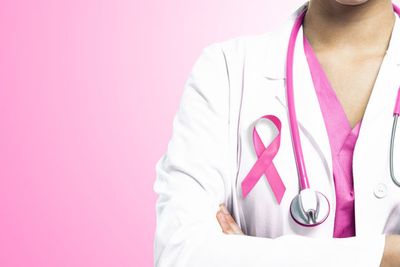Breast cancer is a complex disease, affecting not just the body but the mind as well. Dealing with cancer can be overwhelming not just for patients but for their loved ones, too. The good news is that you will have a dedicated cancer treatment team to help you along your journey.
There are a number of health care professionals and related experts who are involved with diagnosing and treating breast cancer and supporting patients' general physical and emotional well-being.
Ideally, these health professionals work together from the initial evaluation and diagnosis to treatment planning. This integrated approach to cancer care helps ensure patients get the best possible treatment while also improving their quality of life.
Health professionals who may be involved with your care include:
- Radiologist—a doctor trained to read or interpret imaging studies, such as mammograms, ultrasound, CT scan and magnetic resonance imaging (MRI), to diagnose and treat breast diseases. The radiologist may also use imaging techniques to guide the positioning of the needle during a breast biopsy procedure or pinpoint the exact location of the lump for surgery.
- General surgeon or breast surgeon—a doctor who is skilled in breast surgery. The surgeon will help you decide how to proceed with treatment, the timing of treatment, the options for surgery, chemo and even radiation. The surgeon may perform a surgical breast biopsy (removing a sample of breast tissue to determine whether cancer is present) and, if it is cancerous, surgically remove the tumor. They can take the tumor only (lumpectomy) or remove the entire breast (mastectomy). They will also do lymph node biopsy or removal procedures.
- Oncologist—a medical doctor specially trained to diagnose and treat cancer. He or she will take the lead in coordinating your cancer treatment, including the use of chemotherapy, hormone therapy, managing side effects and monitoring you after treatment.
- Radiation Oncologist—a medical doctor trained to use radiation to treat cancer. There are many treatment types and lengths of treatment. This doctor will help guide you through the options to select what works for you.
- Radiation therapist—a person who assists radiation oncologists (doctors who use radiation to treat cancer) in administering radiation therapy.
- Nurse/oncology nurse specialist—a nurse who specializes in treating and caring for people who have cancer. The nurse works with the oncologist to coordinate the patient's care by collaborating with other team members to ensure all bases are covered.
- Pathologist—a doctor who has special training to examine cells under a microscope and identify diseases.
- Reconstructive/plastic surgeon—if the original surgeon does not do the breast reconstruction after a mastectomy or lumpectomy, a plastic surgeon is usually called in to surgically reshape or restore (reconstruct) the appearance of a breast for women who have had a breast removed (mastectomy) to treat breast cancer.
- Genetic counselor—an expert who can assess your risk of developing breast cancer based on family history and help walk you through the pros and cons of getting tested for the breast cancer gene (BRCA) and other genes, as well as the possible outcomes of the test and next steps.
- Oncology social worker—an expert specializing in cancer treatment and care who can provide emotional support to you and your family, help you navigate the health care system, answer questions about financial matters related to your cancer treatment, and research housing options should you need to travel to another hospital for treatment.
- Psychologist/psychiatrist—a mental health professional who can provide individual and family counseling. A primary goal is to help women and/or their partners cope with the physical, emotional and lifestyle changes associated with having breast cancer, as well as the distressing medical treatments.
- Nutritionists and dietitians—experts who can evaluate your diet and nutritional habits and help you structure healthful eating patterns during and after cancer treatment. Eating well and getting the nutrients your body needs will help you stay strong.
- Gynecologist or OB/GYN, family practitioner, or other primary care provider—a health care professional who will help coordinate your immediate care and follow-up. There are some long-term and late effects of cancer treatment, especially from chemotherapy, so it's important that you keep your primary care provider in the loop, and follow up if you have any persisting problems after cancer treatment (for example, fatigue, lymphedema—or sexual problems).
- Physical Therapist—A trained therapist who works with women after treatment to preserve mobility in their arm, shoulder and chest. He or she may be certified in the management of lymphedema (fluid retention) that may occur after surgery and/or radiation therapy.
Remember, you are a critical part of the team. Always talk with members of your health care team if you have concerns or are unsure about anything related to your cancer treatment plan. Consider taking an advocate (a family member or friend) with you to your medical appointments. This person can take notes and serve as a "second ear," when you are feeling overwhelmed with information or too fatigued to absorb a lot of details. Ask about available support groups, too. It's always reassuring to know that there are other women like you who are going through treatment and have many of the same questions and concerns.
The Society for Integrative Oncology, a multi-disciplinary professional organization for integrative oncology, in their quest to help enhance the lives of cancer patients, has recognized and published guidelines for practitioners to use a multi-disciplinary approach for managing anxiety, mood disturbances and chronic pain that may accompany a cancer diagnosis and subsequent treatment.


